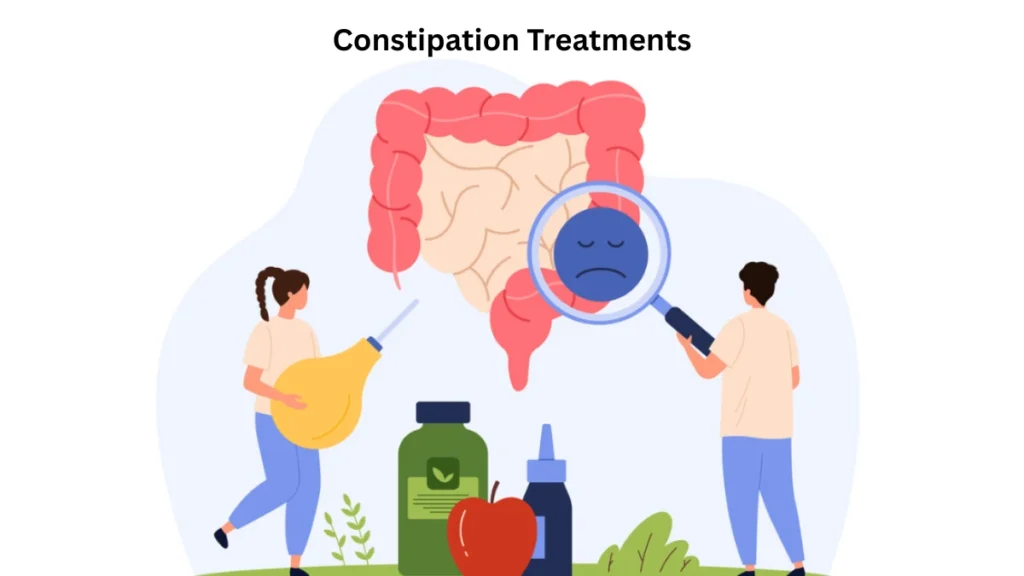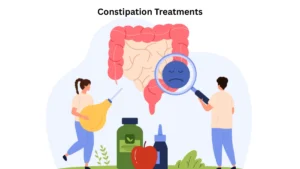Constipation Treatment: Constipation is a common digestive issue that affects people of all ages. It’s typically characterized by infrequent bowel movements, difficulty passing stools, or a sensation of incomplete evacuation. While occasional constipation is normal, chronic constipation can affect your daily life and may indicate an underlying health issue. This article covers everything you need to know about constipation treatment — from lifestyle remedies to medical options.
| Aspect | Details |
|---|---|
| Definition | Fewer than 3 bowel movements per week; difficulty passing stools |
| Common Symptoms | Hard stools, bloating, abdominal pain, straining, feeling of incomplete evacuation |
| Main Causes | Low fiber diet, dehydration, inactivity, medications, medical conditions |
| Dietary Changes | Increase fiber (fruits, veggies, whole grains), drink more water |
| Lifestyle Adjustments | Exercise regularly, don’t ignore the urge, establish a bathroom routine |
| OTC Treatments | Bulk-forming agents, stool softeners, osmotic and stimulant laxatives |
| Prescription Medications | Lubiprostone, Linaclotide, Prucalopride |
| Alternative Therapies | Biofeedback, probiotics, herbal supplements (with doctor’s advice) |
| When to See a Doctor | Persistent symptoms >2 weeks, rectal bleeding, severe pain, sudden weight loss |
| Prevention Tips | High-fiber diet, hydration, regular activity, avoid laxative overuse |
| Surgical Options (rare) | For cases like rectal prolapse, obstruction, or congenital issues |
What is Constipation?
Constipation occurs when bowel movements become less frequent or more difficult to pass. Medically, it is defined as having fewer than three bowel movements per week. It’s often accompanied by bloating, discomfort, or the feeling of incomplete evacuation.

Constipation Treatments
| Section | Details |
|---|---|
| 1. High-Fiber Diet | Include fruits, vegetables, whole grains, and legumes to soften stool. |
| 2. Hydration | Drink 8–10 glasses of water daily to help bowel movement. |
| 3. Regular Exercise | Physical activity improves intestinal muscle contraction. |
| 4. Over-the-Counter Laxatives | Use bulk-forming or osmotic laxatives cautiously under medical advice. |
| 5. Bowel Routine Training | Try to go at the same time daily to build regularity. |
| 6. Probiotics | Yogurt and supplements help balance gut bacteria and improve digestion. |
| 7. Limit Dairy & Processed Foods | These can slow down digestion and worsen constipation. |
| 8. Herbal Remedies | Senna, triphala, and psyllium husk may aid digestion naturally. |
| 9. Stool Softeners | Short-term use can ease passing stool without straining. |
| 10. Medical Intervention | Consult a doctor if symptoms persist, especially with pain or bleeding. |
Read more: Life Insurance Corporation (LIC): A Comprehensive Guide to India’s Largest Insurer
Signs and Symptoms of Constipation
- Fewer than three bowel movements per week
- Hard, dry, or lumpy stools
- Straining during bowel movements
- Abdominal bloating or cramps
- Feeling like the rectum is blocked
- Needing assistance to empty the rectum (e.g., using hands or fingers)
Read more: Epidural Injection Price in UAE: What Expecting Mothers Should Know in 2025
What Causes Constipation?
There are many potential triggers, including:
Diet and Lifestyle
- Low fiber intake (insufficient fruits, vegetables, or whole grains)
- Inadequate fluid consumption
- Sedentary lifestyle or lack of exercise
- Delaying the urge to have a bowel movement
Medications
- Painkillers (especially opioids)
- Antacids containing calcium or aluminum
- Antidepressants
- Iron supplements
Medical Conditions
- Irritable Bowel Syndrome (IBS)
- Diabetes
- Hypothyroidism
- Neurological disorders (e.g., Parkinson’s disease, multiple sclerosis)
- Pregnancy
Lifestyle and Dietary Changes to Relieve Constipation
Making small changes to your daily habits can have a big impact:
Increase Fiber Intake
Gradually incorporate fiber-rich foods like leafy greens, fruits with skin (e.g., apples, pears), whole grains, beans, and lentils.
Drink Plenty of Fluids
Aim for at least 8 glasses of water per day. Proper hydration helps soften stools and supports bowel function.
Exercise Regularly
Physical activity stimulates digestion and bowel movement. Walking, swimming, or yoga can be particularly beneficial.
Practice Bowel Training
Try to go to the bathroom at the same time every day, especially after meals. Don’t ignore the natural urge to pass stool.
Over-the-Counter (OTC) Treatments
If lifestyle changes aren’t enough, OTC laxatives may help:
- Bulk-forming laxatives (e.g., psyllium): Increase stool volume
- Stool softeners (e.g., docusate sodium): Add moisture to stools
- Osmotic agents (e.g., polyethylene glycol): Draw water into intestines
- Stimulant laxatives (e.g., bisacodyl): Trigger intestinal contractions
Important: Overuse of laxatives can lead to dependency. Use under guidance.
Prescription Medications
For chronic or severe cases, a doctor may recommend prescription medications such as:
- Lubiprostone (Amitiza)
- Linaclotide (Linzess)
- Prucalopride (Resolor)
These drugs work by increasing fluid secretion in the intestines or enhancing muscle contractions to ease stool passage.
Supportive and Alternative Therapies
Biofeedback Therapy
This technique helps retrain pelvic floor muscles if improper muscle coordination is contributing to constipation.
Probiotics
Certain probiotic strains may support gut health and promote regular bowel movements.
Herbal Remedies and Acupuncture
These are used in traditional medicine, but consult a healthcare provider before starting any alternative treatment.
When to See a Doctor
See your doctor if you experience:
- Constipation lasting longer than 2 weeks
- Blood in stools
- Unexplained weight loss
- Severe abdominal pain
- Inability to pass gas or stool
Tests may include colonoscopy, blood tests, or imaging to check for underlying conditions.
Surgical Options (Rare Cases)
Surgery is a last resort and may be considered for:
- Rectal prolapse
- Bowel obstruction
- Hirschsprung’s disease (in children)
Procedures may involve removing part of the colon or correcting anatomical issues.
Prevention Tips
- Eat a fiber-rich diet consistently
- Drink water throughout the day
- Stay physically active
- Establish a regular bathroom routine
- Avoid excessive use of laxatives
Frequently Asked Questions (FAQs)
How much fiber should I consume daily?
Adults should aim for 25 to 30 grams of fiber per day.
Can stress cause constipation?
Yes. Stress affects your digestive system and can lead to bowel irregularities.
Is chronic constipation dangerous?
Chronic constipation can lead to complications like hemorrhoids or anal fissures and may signal other health issues.
Are bananas good or bad for constipation?
Ripe bananas may help, but unripe bananas can make constipation worse.
Can I take laxatives daily?
Regular use of stimulant laxatives is not recommended. Use only under a doctor’s guidance.
Conclusion
Constipation is uncomfortable but manageable with the right approach. Most cases improve with simple lifestyle changes, but persistent or severe constipation requires medical attention. Start by adjusting your diet, drinking more water, staying active, and exploring safe treatments if needed.
Don’t suffer in silence. Talk to your doctor if your symptoms don’t improve — early intervention makes all the difference.





